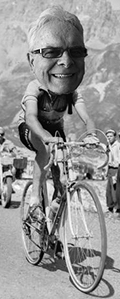Six short tales from across the years
 Mon, March 8, 2021
Mon, March 8, 2021 1.) As a child during the 1940s I lived in a house in England with no electricity and no water piped into the house. Water was brought in by bucket from a communal well outside. Lighting was by oil lamp and candles. My mother cooked with a coal fired range and baked wonderful pies and cakes. She did so without a thermometer on the oven.
She ironed with a flat iron also heated on the stovetop. She would spit on the iron to test the temperature, the spit would boil and run off immediately if it was hot enough. She had a pair of flat irons, one would be heating while she ironed with the other for a minute or so before it cooled.
2. It was early 1946 in England; WWII had been over less than a year. I was ten years old. King George VI, father of Queen Elizabeth was coming through our town on his way somewhere else. In the days leading up to this event, we made paper flags at school
Whether real flags were not available, or the school was too cheap to buy us flags, I don’t know. But we each drew and colored a British flag on both sides of a piece of paper and then glued it to a stick.
The day finally came, and we all lined up at the roadside. We waited, and we waited, freezing our little asses off, for at least an hour. Finally, here came the motorcade, passing through at about 45 mph. We all started cheering and waiving our little paper flags.
Someone shouted, “There he is” and pointed. I think I saw King George VI that day, I can’t be certain, but I think I did.
3.) As an eighteen-year-old in 1954, walking home in the early hours of a Sunday morning, after a Saturday night out, when an older drunk man, probably in his forties, tried to pick a fight with me. He took a swing at me but missed and fell over. I carried on walking home but heard a tremendous crash as he had fallen backward through the plate glass window of a television shop. The noise was deafening as the sound amplified through the empty streets. The last I saw of the drunk, he was lying on his back amongst the TV sets, with his legs in the air.
I took off running, and was chased by two American Military Police, in a Jeep. They pulled alongside me, and when they saw I was not an American Serviceman, they stopped and gave up the chase. I made it home without further incident. Later the local newspaper told the story of a broken store window mystery, and that nothing was stolen. There was no mention of the drunk guy. I guess he was not seriously hurt and had left the scene.
There was a large American Air Force Base, near where I lived. The Military Police would patrol the streets but had no jurisdiction over civilians. We called them "Snow Drops" because they wore white helmets, reminding us of a British wild flower that has white bell shaped petals and is called a Snow Drop.
4.) In 1968 (Age 32.) I saw Jimi Hendrix play in Nottingham, England, At the time he was still relatively unknown in America. The show was in a small venue and was the loudest concert I have ever been to. He had Marshall speakers stacked floor to ceiling. I stood at the back of the room and the sound was actually pushing my chest in. I don’t believe it was by chance his band was called “The Jimi Hendrix Experience.”
5.) In the mid 1980s the owner of a bike store in Denver asked me if I would make an exception for a very special customer and personally measure him for a custom frame. The customer was the manager of the Denver Broncos football team. (I don’t recall his name.) The team was coming to San Diego to play the Chargers and after the game he would drive up to see me.
The outcome was, the Chargers beat the Broncos, and the team and the manager took an early flight home. (Obviously, sore losers.) I never did get to measure him or build him a frame. Had I done so I would probably remember his name.
 6.) In the late 1980s I was approached by Fila, the sports clothing company. They were interested in a line of bicycles with the Fila name on them. Two people from the company came to my shop to look at my operation, and we talked about my building these frames. They must have dropped the idea, I never heard back, and I don't recall anyone else making a Fila bike.
6.) In the late 1980s I was approached by Fila, the sports clothing company. They were interested in a line of bicycles with the Fila name on them. Two people from the company came to my shop to look at my operation, and we talked about my building these frames. They must have dropped the idea, I never heard back, and I don't recall anyone else making a Fila bike.























Point of View
If you could assemble a hundred people, all the exact same height, and then further separate into groups made up of those with similar leg length.
You would find within those groups, the thigh, lower leg and foot measurements would all vary.
Even within the same race, people have different facial features, complexions, hair color, etc. When you consider all peoples, the variations are infinite. An individual’s finger prints are unique, and now we know that DNA is too.
Most people accept these differences and seldom question why. Therefore, it really should be no surprise that people’s opinions will vary even more infinitely than our physical differences.
What are opinions but a collection of thoughts, based on our individual beliefs and experiences? Sometimes called a “Point of View,” meaning literally, the world as one individual sees it from where they stand.
In spite of this we sometimes argue and fight defending our point of view, or try to impose our opinions on others.
We accept every other difference in the human species, why do we expect the thought pattern of others to be in line with ours? We are each a free thinking spirit, and I can’t think of anything more random that a person's thoughts.
Could it be because our opinions are the yardstick by which we view and evaluate the world? It is how we judge situations and other people. Our opinions have been formed largely by our life experiences, our parents, teachers and other pivotal people in our lives.
Our opinions can change over time with changing circumstances, if we find a better one we change it. However, at any given time our opinion is the best it can be. We just can’t understand why anyone would have a different opinion, after all, ours is the best.
It is the single most cause of conflict between individuals, co-workers, friends, and families. On a larger scale, it is the basic reason nations assemble armies and go to war with each other.
I have found that defending one’s point of view is just a huge waste of time and energy. It achieves little. Rarely does either side move any closer to the other’s way of thinking. Often it drives the two sides further apart
Instead I find it more constructive and fruitful to listen to the other’s opinion. Another’s estimation is often difficult to understand and may even arouse aversion.
But by the simple act of listening, I can better understand the other's point of view without the obligation that it has to become my point of view. I may not necessarily agree, but I may see the position he is standing that gives him that view.
Blindness is not always the inability to see, it is ofttimes caused by refusing to step out of the darkness. Just my point of view.
First posted April 2012